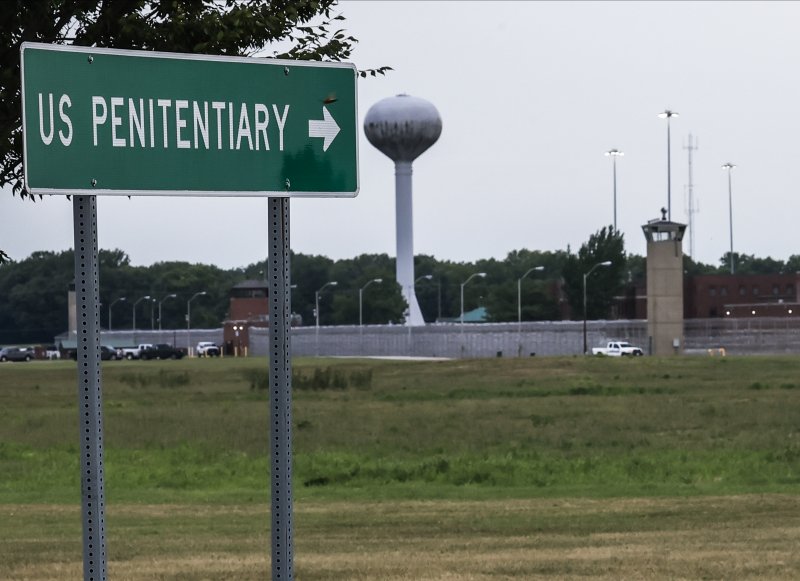A sign points to the Federal Correctional Complex, where the federal execution chamber is located, in Terre Haute, Ind., on July 15. Inmate Orlando Hall is scheduled to die there on Thursday. File Photo by Tannen Maury/EPA-EFE
Nov. 18 (UPI) -- The U.S. government carried out its eighth execution this year on Thursday, putting to death a man convicted of murdering a 16-year-old Texas girl in 1994.
Orlando Hall of Arkansas died by lethal injection at the U.S. Penitentiary in Terre Haute, Ind., after 25 years on death row. He was pronounced dead at 11:47 p.m., the Department of Justice announced in a statement.
Hall was executed following an 11th hour decision by the Supreme Court to vacate a lower court's stay, with Justices Stephen Breyer, Sonia Sotomayor and Elena Kagan saying they would have ruled against the government.
The Supreme Court overturned District Judge Tanya S. Chutkan who ruled a stay of execution earlier Thursday, saying in her opinion that "the public interest is not served by executing individuals in this manner."
"The court is deeply concerned that the government intends to proceed with a method of execution that this court and the Court of Appeals have found violates federal law," she wrote.
A divided District of Columbia U.S. Circuit Court of Appeals ruled Wednesday that it would not intervene in Hall's execution, or Brandon Bernard's on Dec. 10., in a case objecting to the government's use of the pentobarbital drug in lethal injection executions. They were among 13 death row inmates who sought an injunction to block federal executions after William LeCroy was found to have experienced pulmonary edema while conscious during his execution in September.
The 7th U.S. Circuit Court of Appeals also denied a stay of execution on Wednesday night. Hall's attorneys sought the injunction on the grounds that his conviction was the product of racial discrimination. Hall is Black and he was convicted by an all-White jury.
Hall, 49, and four other men were found guilty of kidnapping and murdering Lisa Rene. Prosecutors said they killed the teen because her two older brothers stole about $4,700 from them as part of a drug deal.
The Justice Department said the men were involved in a marijuana trafficking operation in Pine Bluff, Ark., and traveled to Arlington, Texas, to confront one of the men. They found his sister at their home and kidnapped her at gunpoint.
Prosecutors said the men drove Rene to a hotel in Arkansas, where they raped her before driving her to a park, beating her and burying her alive.
After the government announced Hall's execution date in September, his attorneys said it would be a "grave injustice" to move forward with the execution. They argued that although Hall never denied involvement in Rene's death, they don't believe the jury would have sentenced him to death if they knew "key facts" about his case.
"Because Mr. Hall's court-appointed attorneys conducted no meaningful investigation into the case, the jurors were unaware of the severe trauma Mr. Hall suffered growing up in a home marked by poverty and brutality, where he and his siblings witnessed almost daily violence in their parents' marriage," a statement from Marcia Widder and Robert Owen said.
Of the five men charged with Rene's murder, only Hall and one other, Bruce Webster, faced capital prosecution by the federal government. The other three were allowed to sign plea deals for prison time in exchange for testifying against Hall and Webster. Those three men have each served their sentences and been released from prison.
Defense attorneys also blamed racial bias in the selection of Hall's all-White jury.
"During jury selection, the prosecution team enlisted the help of a former state prosecutor known for keeping Black citizens from serving on criminal juries," Hall's attorneys said.
"In the years since Mr. Hall's trial, the U.S. Supreme Court has expressly found that this very prosecutor, in a trial that preceded Mr. Hall's, discriminated against Black potential jurors on account of their race and then lied under oath in an attempt to conceal his racist conduct."
An analysis released earlier this month by the Death Penalty Information Center found that people of color -- particularly Black Americans -- have disproportionately faced execution in the United States.
Of the 57 people presently on federal death row, 34 are persons of color. More than two dozen are Black men and some were convicted by all-White juries.
Hall was the eighth person put to death by the federal government this year. The Justice Department resumed federal executions in July after a 17-year hiatus.
The federal government had scheduled three executions to be carried out between Election Day and the inauguration of President-elect Joe Biden. Some critics, including Democrats in Congress, have called for the Trump administration to halt those executions and leave them for the next administration to handle.
The DPIC said a federal execution hasn't been carried out during a lame-duck presidency since 1880 under the administration of President Grover Cleveland -- that of Richard Smith.
"These executions are a further illustration of how deviant and dangerously out of touch this government's conduct has been during the entire course of this execution spree," DPIC Executive Director Robert Dunham said.
"No lame-duck president has attempted to carry out an execution in more than a century. And to cavalierly do so, as infections from a virus that has killed a quarter million Americans are exploding across the country, exhibits a pathological lack of concern for public health and safety."















